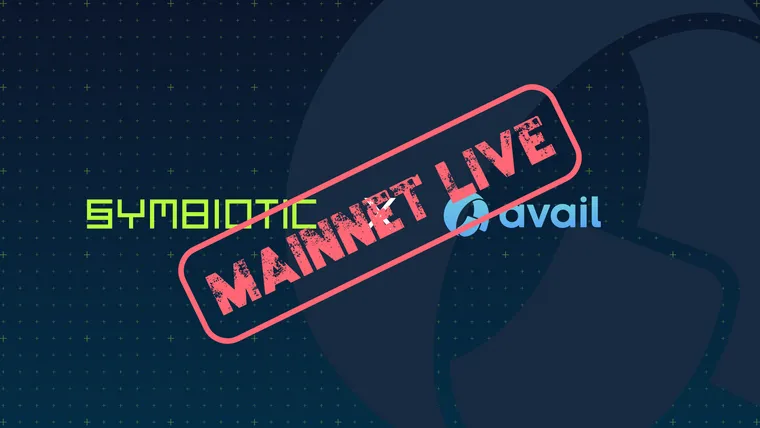Avail is built on the belief that blockchains are stronger when they work together. To achieve this Avail helps connect blockchain networks and applications to provide a unified ecosystem for everyone. The partnership with Symbiotic illustrates the power of unification, and makes Avail DA the leading data availability solution for builders on Symbiotic. This partnership also accelerates the launch of Avail Fusion, the security network layer adding crypto-economic security via re-staking, and opens up ecosystem-wide access to verified services on Avail.
Developers building with Symbiotic can now leverage Avail DA to keep transaction data secure and publicly verifiable without breaking the bank. If you'd like to start building on Avail & Symbiotic today, reach out to @robin and @naruto who can help guide you through your development journey. You may also be interested in Alpha Engine, which enables rollups to maximize revenue through MEV capture while ensuring security through restaking with Symbiotic and high throughput on the Avail Network.
Symbiotic & Avail Unified
Integrating Symbiotic with Avail’s modular data availability network, offers validity proofs and data availability sampling, making the launch of blockchain apps and services that are trust minimized, publicly verifiable and game theoretically robust far less complicated. It’s a powerful combination, enabling builders to sharply accelerate their go-to-market and significantly reduce development costs.
It also introduces a new class of innovative, validated services within the Avail network to provide critical services for a future built on horizontally scalable blockchains. These validated services can cover everything from custom intent networks, insurance networks, policy engines, computation engines, coprocessors, validation and sequencing services, and a whole lot more.
Re-Staking & Unified Security on Avail Fusion
Builders developing high value apps and services will be able to secure them on Avail with added crypto-economic security through Avail Fusion, with support from multi-asset re-staking via Symbiotic. Through the Symbiotic partnership, blockchain and app developers inherit Avail’s native security, while simultaneously tapping into the security of ETH and any other ERC20 token.
Anyone building on Avail will be able to leverage this security within their own smart contract platforms without having to individually pay for re-staking services, as this re-staked security is shared across the board for anyone who builds on Avail. It’s like having one big security vault at the base layer, secured by multiple assets, which is automatically inherited by everyone that uses Avail.
Avail Fusion supports ERC-20 tokens as well as ETH, and incentivises stakers to secure the Avail network with AVAIL staking rewards.
“This partnership with Symbiotic stands as a huge leap forward for re-staking and modular blockchains as it shows how connected the blockchain ecosystem will become as more teams and technologies embrace connection and interoperability.” Anurag Arjun
A huge challenge faced by new teams is figuring out whether or not to launch a token when deploying a new network or rollup, and deciding what role that token will play if they do. With the Symbiotic integration, chains launching on Avail will be able to contribute to their own shared security by staking their native tokens in Fusion.
A Unified Framework for Innovation with Symbiotic & Avail
You can build with any VM or rollup stack, while inheriting scalability, verification and shared security for transaction ordering on Avail DA. With Avail and Symbiotic, developers can build:
Sequencing Services
Sequencers are a vital component of rollup architecture that need to be decentralized in order to improve trust assumptions for millions of rollup users. As one of the key components of the rollup stack, it’s easy to see how valuable sequencing services will become to builders on Avail. Now with Symbiotic and Avail’s partnership, anyone building a custom sequencer can easily secure it with re-staking to quickly fine-tune sequencing services as needed.
Key Management and Custodial Infrastructure
Developers and users will continue to require novel ways of managing and storing cryptographic keys. This vital infrastructure can harness the re-staked security of Symbiotic to create distributed services that manage and implement custom key management software within a decentralized ecosystem. Builders on Avail can tap into this vital tooling to enhance their applications.
Intent Networks
Building intent networks on top of Avail where users sign intents to execute some task can be rapidly deployed. The intent network can analyze different data sources to decide on the most efficient way to fulfill a user’s intent.
For example, if a user wants to swap Arbitrum ARB tokens for GMX tokens, the intent network can analyze the optimal path to achieve best execution. It can analyze market conditions, slippage, transaction fees, network congestion and so on before executing the swap and fulfilling the user’s intent.
Cross-chain Interoperability
Cross-chain messaging services can be built out to provide access to secure asset flow for builders and users. Smart contracts can leverage these services to access liquidity or interact with other smart contracts on different chains for added functionality. To launch one of these services, builders can tap into Symbiotic vaults and access crypto-graphic security, then deploy a validated cross-chain service for the Avail ecosystem.
Policy Engines
A number of policy engines can be built on top of Avail as appchains or validated services for decentralized applications to leverage.
For example a DeFi protocol that wants to prevent stolen assets from being used in the protocol can use a policy engine to do so. Such a policy engine can identify incoming assets through a combination of on-chain and off-chain data. Once identified, the policy engine can notify the DeFi protocol which can block the stolen assets from being used in the DeFi protocol.
This policy engine can be developed for a specific DeFi protocol or abstracted into a standalone product as a dedicated app-chain.
Insurance Networks
With the global insurance sector exceeding 7 trillion USD in revenues in 2023, there’s a lot of opportunity for more effective and efficient insurance networks to be built on blockchains to lower costs for end users, and enable more transparent, verifiable services.
With Symbiotic as the economic security engine and Avail as the base layer of a modular appchain stack, a developer can quickly spin up a functioning insurance blockchain network and benefit from the low cost, scalability and end-user verifiability of Avail.
For example, a blockchain based insurance network can be created to insure the risk of data breaches for companies and small businesses around the world. This can be a very lucrative insurance network for a startup or developer to pursue.
How to start building on Avail Today
Avail DA went live on mainnet in July, and it’s easy to get started building with Avail today.
With the announcement of significant partnerships including five major rollup stacks (Arbitrum, Optimism, Polygon, Starknet and ZKSync) as well as application ecosystems like Lens Protocol building on Avail, you will join a community of fun, innovative and mission driven builders. Led by former Polygon co-founder Anurag Arjun, Avail earlier raised $75 million in funding, from high profile investors like Peter Thiel’s Founders Fund, Dragonfly Capital and Cyber Capital.
Join the developer community on Discord and Telegram. Say hi to @robin and @naruto who can help guide you through your development journey and connect you with the rest of the development team.


